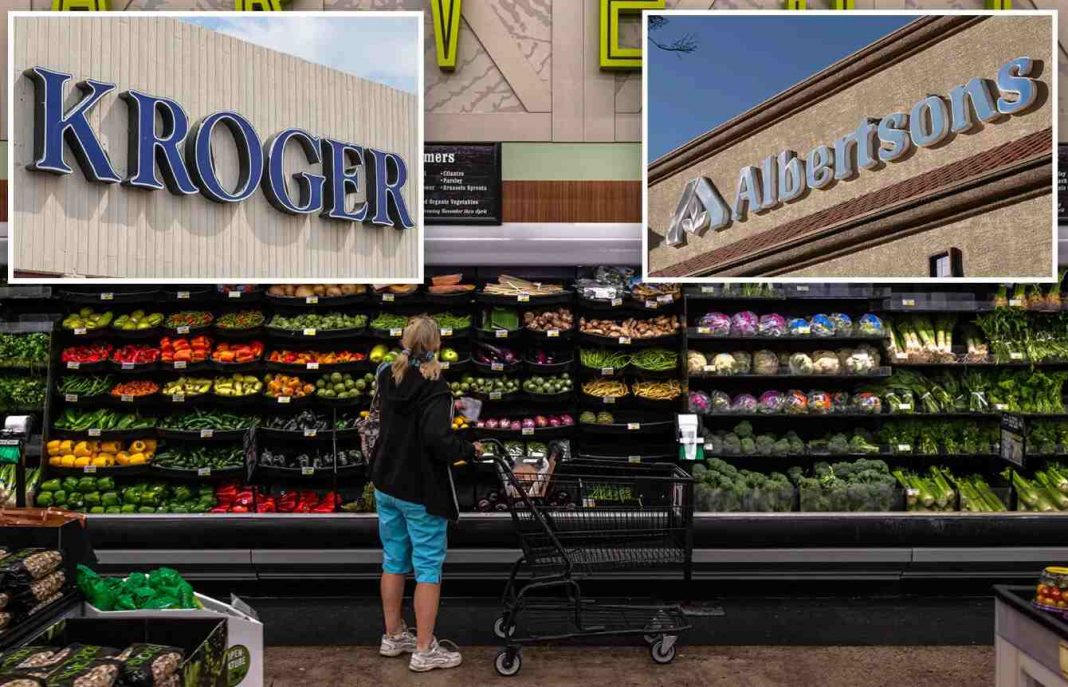Albertsons and Kroger are in negotiations to merge in what would be one of the industry’s biggest deals in years, creating a behemoth food retailer to compete with Walmart, according to four individuals with knowledge of the preparations.
The agreement might be revealed as early as Friday, according to the individuals, who sought anonymity because the negotiations were private.
A merger would unite the two biggest supermarket chains in the United States, which together produce $209 billion in yearly sales and operate more than 5,000 shops. That would make them more competitive against large-scale retailers like Walmart, Amazon, and Costco. Last year, food accounted for $55% of Walmart’s U.S. sales, or $218 billion.
A transaction would almost surely attract antitrust investigation from authorities, who have been focusing on the potential ability of huge firms to influence pricing as inflation pushes up the price of food and other commodities. Kroger and Albertsons would most likely propose the sale of some stores to resolve any antitrust issues. The head of the Federal Trade Commission, Lina Khan, has voiced concern that these measures are enough. The FTC is expected to evaluate any agreement.
Former F.T.C. chairman William Kovacic said, “They will be subjected to a degree of scrutiny not before applied to grocery store mergers.”
Bloomberg reported earlier that Kroger and Albertsons did not immediately reply to a request for comment on the prospective merger.
Kroger, headquartered in Cincinnati, runs around 2,750 grocery shops in the United States under names such as Ralphs, Dillons, and Harris Teeter, and has a market valuation of approximately $32 billion. Albertsons, headquartered in Boise, Idaho, operates 2,200 supermarkets under brands such as Albertsons, Safeway, and Vons, and has a market valuation of around $15 billion.
The private equity company Cerberus and a group of investors purchased Albertsons in 2006 and merged it with Safeway for $9 billion in 2015. Since then, it has considered a number of agreements that were eventually abandoned, including a combination with Rite Aid in 2018 and Whole Foods Market and Sprouts Farmer’s Market the year before. The grocery store revealed in February that it was considering selling the business.
According to several industry observers, Albertsons and Kroger needed to combine in order to compete with big-box retailers. In California, for instance, supermarkets had 95% of the retail food market twenty-five years ago, according to Burt Flickinger III, managing director of Strategic Resource Group, an organisation that works with the supermarket business. Today, he said, that percentage has decreased to 35%.
Mr. Flickinger explains, “These two organisations can combine their abilities and size to increase their purchasing or procurement power compared to Amazon, Costco, and Walmart.” “You really need the combination to reduce operational expenses and give them greater ability to significantly reduce pricing for customers.”
During the epidemic, grocery shops prospered as homebound customers stocked up on food. However, they have lately experienced pressure from supply chain issues and rising food prices. Grocery chains must strike a balance between their connections with consumer brands who sell items via their shops and customers who are feeling the pinch of inflation and are wanting to save money, a situation that results in razor-thin profit margins.
Thursday’s publication of the latest Consumer Price Index revealed that inflation remained persistently high through September, with food prices continuing to increase.
Despite this, industrial mergers have a poor track record. Sysco and US Food, the two largest food distribution corporations, terminated their $3.5 billion acquisition in 2015 after the F.T.C. filed suit to prevent the agreement. In the same year, the F.T.C. demanded that Albertsons and Safeway liquidate over 100 stores before their merger was approved. The grocery retailer that purchased these shops, Haggen, eventually declared bankruptcy.
An investment banker who is not engaged in the transaction and requested anonymity said that regulators are likely to investigate and force the divestiture of stores in cities and other locations where Kroger and Albertsons outlets overlap significantly. It is possible that the F.T.C. will examine Chicago, Denver, and Seattle, he added.
Thursday afternoon, consumer protection organisations had already raised red flags over the potential merger. The American Economic Liberties Project, a non-profit organisation that advocates antitrust laws, denounced the potential merger as “poor for consumers, employees, and communities.”
The group’s executive director, Sarah Miller, said in a statement, “A Kroger-Albertsons transaction would squeeze people already struggling to purchase food, crush employees working for decent pay, and demolish local, neighbourhood businesses.” This merger is a clear example of monopolistic power, and it should be blocked.

